
TLDR: Whether you’re debating getting a cs degree or starting a coding bootcamp, trying to choose the right tech education path for you, or wondering if you have what it takes to make it as a software engineer, this guide by a Veteran turned Software Developer will walk you through common concerns and the key steps for launching a tech career.
When I was a Teaching Assistant for Code Platoon’s Full-stack Software Engineering program, I heard the same questions from every new cohort:
- “Do I need a Computer Science degree to get a job?”
- “Will I be stuck in one programming language or job?”
- “I don’t consider myself tech-savvy. Can I still become a software engineer?”
Learning a new skill can be nerve-wracking, especially when your future career feels at stake. If you’re a Veteran or military spouse considering a tech career, I want to share some insights from my experience to help you navigate the transition.
Do I need a Computer Science Degree to Get a Job?
This is one of the most common questions aspiring software engineers ask, but here’s the truth: both Computer Science degrees and Coding Bootcamps have value, and either one can lead to a career in software engineering.
Personally, I’ve been selected for tech jobs over peers with CS degrees, but that doesn’t mean degrees are useless. Traditionally, a Computer Science degree provides a theoretical foundation and can be beneficial for long-term career growth, particularly for management roles.
On the other hand, Coding Bootcamps focus on hands-on, job-ready skills that can accelerate your entry into tech. If you decide to go the Coding Bootcamp route, make sure it’s a reputable program that teaches in-demand coding languages and offers strong career support, and you’ll find a place in the tech workforce.
Choosing the Right Education Pathway
Only you can decide what works best for your situation, but here are some suggestions to consider:
- Cost & Funding: Can you fund your education using VA benefits like the GI Bill® or VET TEC?
- Schedule: Can you take on a full-time immersive program, or do you need a part-time, flexible option?
- Curriculum: Does the training program cover modern, relevant, technical skills?
- Career Support: Does it offer resume coaching, interview prep, and employer connections?
- Outcomes: Does it share its graduates' success rates, salary data, and hiring outcomes? If you choose the Coding Bootcamp route, research the best Coding Bootcamp programs out there.
- Community: Would you prefer to learn with an exclusive military community like Code Platoon or a classroom of primarily civilians?
Will I be Stuck in One Programming Language or Job?
The programming language you start learning is not a lifelong restriction. In fact, learning a new language is much easier once you’ve come to understand the logic, problem-solving, and architecture of software. Many companies even train their engineers on new tech stacks or new tools like AI.
Common entry-level tech jobs are Full-Stack Software Engineers, Front-End Developers, and Back-End Developers. For now, be prepared to do any side of the programming stack while you’re still learning.
As you progress, you may explore fields like DevOps, Cybersecurity, Data Science, or Machine Learning. Your first tech job doesn’t have to be your forever job; just keep learning and growing.
I Don't Consider Myself Tech Savvy. Can I Still Become a Software Engineer?
Many successful developers start with zero technical background. My journey to tech began when I saw a USAA billboard that said, "Do You Even Code?" and I had no clue what it meant.
What helped me get started was signing up for free workshops and learning the basics on my own before committing to the career path. I took some UX Design classes and Intro to Coding courses before I committed to software engineering, and I don’t regret that decision at all.
Remember that you’re learning something new. Self-doubt will creep in, but that’s normal. It can be exciting—as well as frustrating— to push yourself to new limits, and every challenge is an opportunity to grow professionally and personally. Embrace the learning process and stay determined.
Final Thoughts: How to Succeed in Software Engineering
Your early tech education lays the foundation for a successful software engineering career, so don't take it for granted. If you're serious about breaking into tech, here are my best pieces of advice:
- Start coding today with free resources before committing to a full training program.
- When you’re ready, pick a reputable program with strong employment outcomes and career support.
- Stay consistent and embrace lifelong learning. Tech evolves constantly, and so should you.
Once you start working in tech, you’ll likely see things done differently than you were taught. However, what matters most for becoming a software engineer is your ability to solve problems, write clean code, and adapt to different tech stacks.
Good luck out there, and happy coding!





